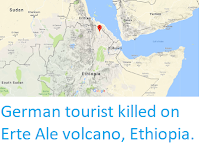The United States Geological Survey
recorded a Magnitude 5.2 Earthquake at a depth of 10.0 km, in the northern part of the Afar Region of Ethiopia, slightly
before 1.30 pm local time (slightly before 10.30 am GMT) on Saturday 24 March 2018. There are no reports of any damage or injuries arising
from this quake, but it was feltlocally, and it is possible that some minor damage has occurred.
The approximate location of the 24 March 2018 Ethiopian Earthquake. USGS.
The deserts of Northern Ethiopia and Southern Eritrea are extremely
volcanically active, with dozens of volcanoes fed by an emerging
divergent margin along the East African Rift; Erta Ale is on the
Ethiopian Rift, the boundary between the Nubian Plate and the Danakil
Microplate. The African Plate is slowly splitting apart along the
Ethiopian Rift and the East African Rift to the south (which is
splitting the Nubian Plate to the West from the Somali Plate to the
East). Arabia was a part of Africa till about thirty million years ago,
when it was split away by the opening of the Red Sea Rift (part of the
same rift system), and in time the Ethiopian and East African Rifts are
likely to split Africa into a number of new landmasses. This rifting exerts pressure on the rocks around the margin of the sea,
slowly pushing them apart, not smoothly but in fits and starts as the
pressure overcomes the tendency of the rocks to stick together, creating shocks that we experience as Earthquakes.
Rifting
in East Africa. The Danakil Microplate is the red triangle to the east
of the Afar depression at the southern end of the Red Sea. Università degli Studi di Firenze.
Witness
accounts of Earthquakes can help geologists to understand these events,
and the structures that cause them. The international non-profit
organisation Earthquake Report is interested in hearing from people who may have felt this event; if you felt this quake then you can report it to Earthquake Report here.
See also...
Follow Sciency Thoughts on Facebook.








